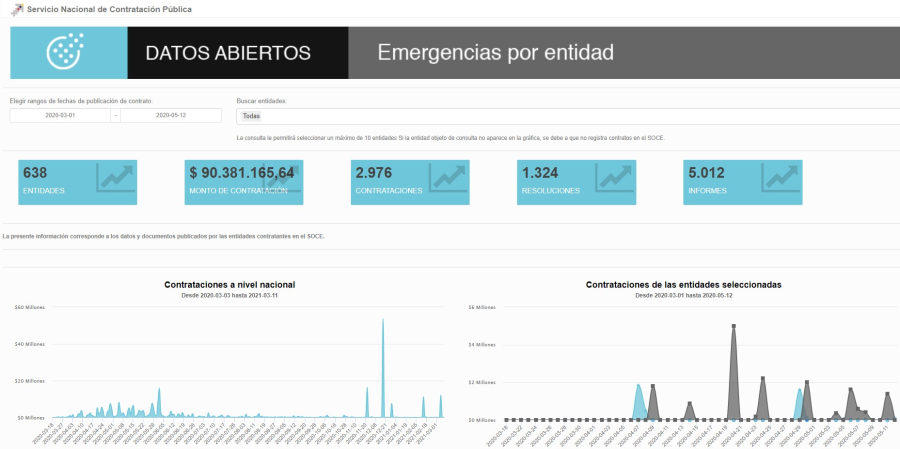
Posted by Lindsey Marchessault[1]
COVID-19 has put unprecedented strain on our economies and public finances. More than 80 countries have applied for rapid financing from the IMF to help meet the challenge of reduced revenues and increased need for public services. To ensure that the funds are put to good use and deliver value for money, more than 40 governments have committed to increasing procurement transparency and oversight of their emergency spending.
Ecuador provides an example of good practice. The country was hit hard by the coronavirus pandemic and stories of overpriced protective equipment and body bags quickly hit the headlines, putting public procurement into the spotlight.
But before the pandemic broke out, a group of government stakeholders and civil society organizations had already begun working together on open contracting reforms to increase efficiency, competition, and transparency in the public procurement system, particularly in the health sector. When the crisis struck, Ecuador was able to build on this progress and transform corruption risks into opportunities to accelerate improvements in transparency in procurement.
Ecuador’s national procurement agency recognized the importance and urgency of this task. Providing better data to citizens on all emergency procurement operations was at the core of this effort.
Less than one month after the WHO declared the coronavirus a pandemic, the government was able to launch a platform that consolidated all information about emergency buying procedures carried out by central and local governments. By early May 2020, the tool had already listed the details of 2,533 open contracts involving 573 entities. Now covering more than 1,000 agencies, the number of contracts has reached more than three times that figure. The platform records more than 8,300 procedures worth a total of more than $310 million.
The technical support provided by the Open Contracting Partnership (OCP) under its Lift program – a program to accelerate government reforms – helped Ecuador to set up the new system, using data that follow the Open Contracting Data Standard. The program has assisted government agencies to interpret the data and to apply tools that better analyze the data. It has familiarized agencies with the analyses they should carry out, using information from the platform, before starting a contracting process. In that respect, for public officials, the launch of the platform represented a “before and after point.” Many agencies began to recognize that the same suppliers were selling to them at different prices. Such evidence enabled the government to improve its negotiating capacity and leverage.
Civil society organizations and the government have been working together to improve procurement processes. The data from the portal allowed CSOs to set up a public procurement observatory, which has started to issue recommendations on how to make buying processes more efficient.
The launch of the data portal was supported by a communication strategy that included introductory training for journalists on the availability and use of the data and the policy implications. The portal has also helped expose cases of fraud and corruption. More than 50 legal cases have now been brought in connection with irregular buying processes during the pandemic.
The government has issued two regulations requiring organizations to quickly publish information on emergency buying. As a result, many of these institutions requested the training so they could comply with the new arrangements and increase the efficiency of their operations during the pandemic. More than 24,000 officials have now been trained through an online virtual course on emergency buying.
Since launching the platform, the government of Ecuador has sustained its efforts to increase transparency and make it even easier for citizens to monitor contracts. For example, the government has turned the emergency procurement platform into a real-time “citizens’ dashboard” tool to track emergency buying. They have also launched a new portal for low-value contracts.
Soon, the government plans to provide open data on all procurement processes as well as beneficial ownership. This will allow the government to meet their IMF commitments. The government also plans to launch a unified medicine purchasing system for the entire public health system.
While the national emergency helped to catalyze these reforms, they demonstrate that more transparency in public procurement is not only necessary but possible and beneficial.
OCP’s LIFT program is currently open for applications until March 12 at lift.open-contracting.org
This article is part of a series related to the Coronavirus Crisis. All of our articles covering the topic can be found on our PFM Blog Coronavirus Articles page.
[1] Director of Data and Engagement, Open Contracting Partnership.
Note: The posts on the IMF PFM Blog should not be reported as representing the views of the IMF. The views expressed are those of the authors and do not necessarily represent those of the IMF or IMF policy.






